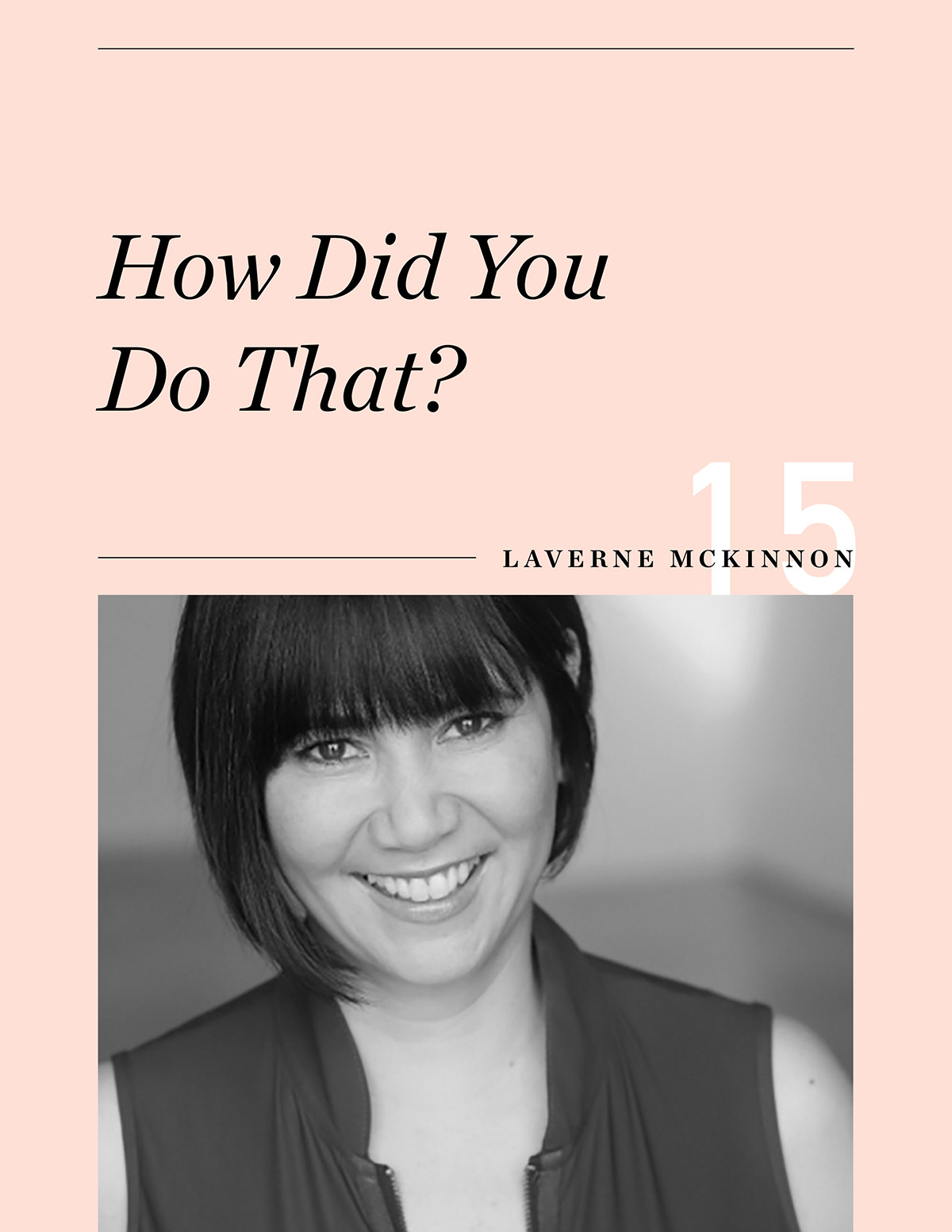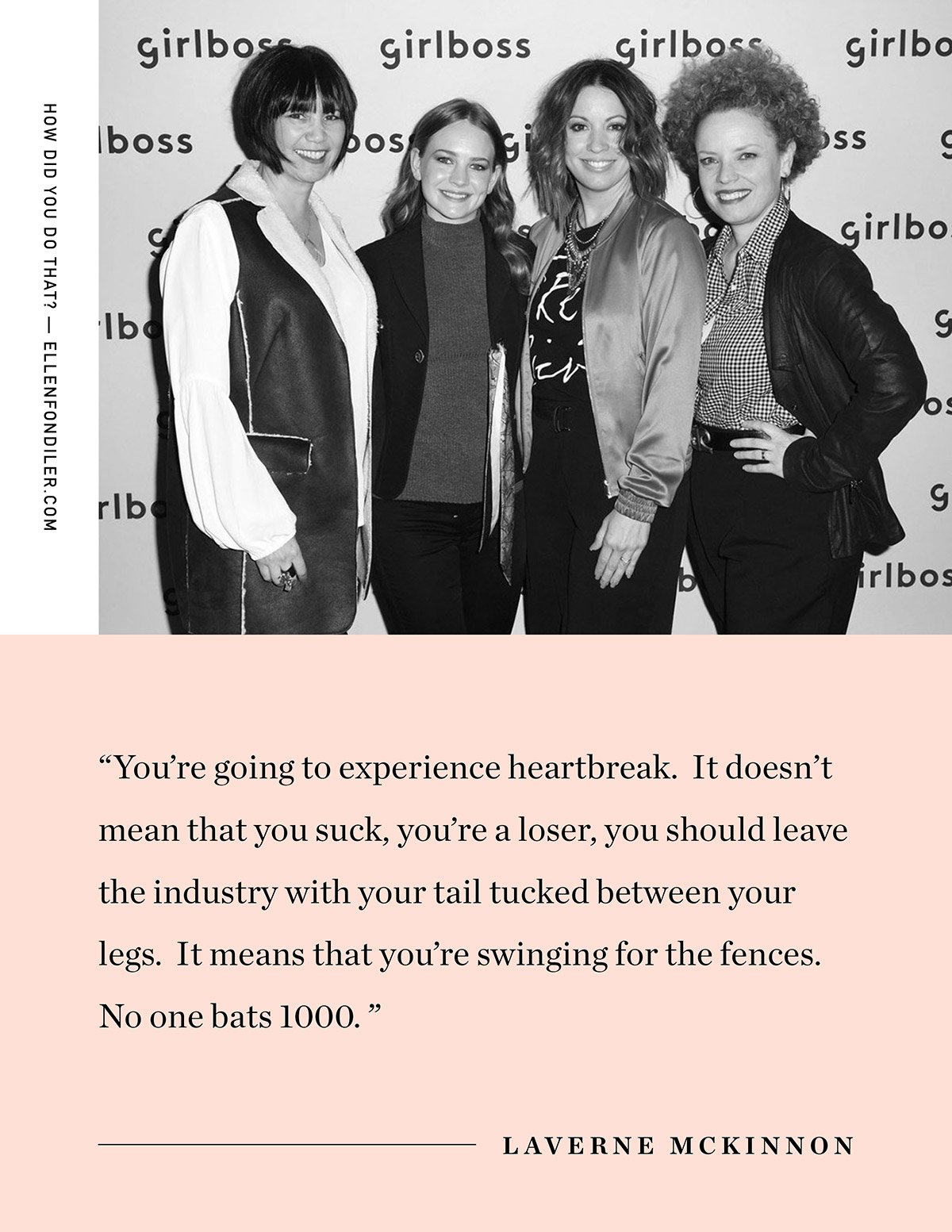
Whenever I meet someone who’s got a really cool job, who runs a thriving business, or who has completed an amazing project, I always want to know: “How did you do that?”
I’m always curious to hear the “behind-the-scenes story”—who they emailed, what they said, how they got their first client, how they got their foot in the door—the exact steps that they took to achieve their goal.
HOW DID YOU DO THAT? is an interview series where we get to hear the REAL story behind someone’s success—not the polished, neat and tidy version.
To see a complete list of all the interviews that have been completed to date, head over here.

Name: Laverne McKinnon
Location: Los Angeles, California
Profession: Television Producer, Executive/Life Coach, Grief Counselor, Adjunct Lecturer
Laverne, you are a modern day Renaissance woman. You produce TV shows. You lecture at Northwestern University. You’re a coach. You’re a grief counselor. You help people heal and transform, using so many different mediums. It sounds like you’ve got five or six incredible careers all rolled into one! How do you figure out where to put your energy on any given day?
Wow – thanks so much! I’ve never been called a Renaissance woman before, but I love it! I recently listened to a Ted Talk from Emilie Wapnick about “why some of us don’t have one true calling” and I felt like she was describing me. I get restless when I’m not learning and growing, and have never felt comfortable unless I was doing many things at once. Over the last several years, I discovered that what links what I do altogether are 3 things: 1. when I’m of service (helping people across their finish lines); 2. helping people find and manifest their dreams; 3. and in order to get to the first two, helping people heal in whatever way is needed.
So on any given day, I try to make sure my energy is coming from that specific place of purpose — whether it’s coaching or teaching or producing. On a more pragmatic level, I’m a planner and a scheduler. I hate to waste time and have a daily “foundation” schedule that energetically sets me up for success: meditation, exercise and time with my kids in the morning.
You recently were an Executive Producer of the Netflix series GIRLBOSS. Take us back to the very beginning of your TV career. What was your very first TV-related job? What was it like? And how did you get hired?
My first job was writing and producing educational films in Chicago and that laid the groundwork for working in television. I had two great mentors: Gerry Rogers and Duffy Swift who taught me about screenwriting, budgeting, scheduling, hiring crews, negotiating deals, casting. They were ridiculously patient and generous.
From there, I took a “step back” when I moved to LA and became an assistant at an agency. It was my un-official Masters in Entertainment. While there was a lot of “grunge” work, it was invaluable because I was on the front lines seeing how writers were hired, projects were packaged and the spoken and unspoken hierarchy of entertainment.
Both jobs came through Northwestern alumni connections – alums were incredibly responsive to meeting me and advocating for me which was such a blessing because I didn’t have a single connection.
What’s been one of the scariest or most discouraging moments of your career so far? What happened? How did you feel? And how did you get through it?
Probably when I was fired from CBS after being with the network for 10 years. That time period was challenging for me: I was a first-time mother, my marriage was in disarray, my dad was diagnosed with terminal cancer, and I had been named head of the drama development department at the number one broadcast network.
When the firing happened, I was quite devastated and took about a year off from working, contemplating leaving the business. I lost my identity and self-worth. It honestly took years to re-build through a tremendous amount of work with a gifted coach, reading self-help books, attending leadership workshops and seminars, and brutal self-auditing.
I had to get through layers and layers of loss, and take the meaning that I had assigned to those losses and turn it around. It’s why I’m so passionate about combining my work as a producer, coach, grief counselor and teacher – we all have loss in our lives and frequently it slows or stops us from meeting our potential and living our purpose.

I am curious to know a little more about the time period when you were fired from CBS after being with the network for 10 years. That’s such a huge life event. How did that feel? What helped you to get through it? How did you survive that?
Any kind of job loss whether it’s being down-sized, let go, a position being eliminated, or being fired is a blow. One study that I read indicates that if both the employee and the employer are in agreement and have a mutual understanding of the circumstance then it helps the employee find positive meaning to the event. In most cases, that’s not the end result so the employee is left assigning negative meaning to the event which was my case.
As I said, my experience was a huge loss for me and it took a “long” time to recover. I didn’t have any tools or skills to figure it out and the meaning I made of the loss was that I was not worthy. The primary thing that helped me through it eventually was asking for and getting help … and to this day, I still work with a coach and am attending workshops and reading books about self-improvement. I’m a huge advocate for always working on one’s personal growth and development. There’s also a great program that I attended called The Hoffman Institute that Billy Bush recently talked about in his getting back on his feet after the Trump scandal.
If someone just got fired, or is going through some other type of grief / loss and feeling really heartbroken, what’s something you’d want that person to know? Like, if you were having tea with that person, or sitting together on their couch, what would you say to them?
To know that they are not alone and that other people have had similar experiences and have recovered. They may be experiencing shame for a number of reasons – “I should have seen it coming, I should have known better, it’s not fair, I’m so stupid, I’ll never find another job, my friends/family won’t understand, etc.” Shame is isolating and can stop/slow the recovery process. Brene Brown’s book DARING GREATLY is a great one to read if you’re experiencing any kind of loss (job, relationship, moving, death – truly any.)
You’re an Executive Producer of the Netflix Series, GIRLBOSS, which is inspired by the true story of Sophia Amoruso, a misfit punk who launched a multi-million dollar clothing company. Sophia’s story is so fascinating to me. What was it about the GIRLBOSS story that made you think, “Yes. I must produce that show!”…?
I love Sophia’s honestly and vulnerably – and having been someone who had felt lost in my life, I related to her story and was inspired that she found her passion and purpose. I also love that Sophia today is onto her next journey post her company Nasty Gal. That’s what life is – we have ups and downs and it’s about bouncing back that defines us, not that we experience loss.

3 THINGS
Lots of people dream about working in the TV industry. It can seem so glamorous. Red carpet events. Cameras flashing. Splashy PR campaigns. Fancy swag bags filled with diamond-flecked facial cream. But of course, the reality of working in TV can be very different. It’s definitely not all glitz and glamour!
What are 3 things that most people don’t know about the TV industry… that, perhaps, they should?
1. Running with the theme of loss that’s been woven through my previous answers, there is a LOT of loss.
There’s a ton of product and passion that’s generated that will never be seen by audiences. Ideas that never get bought, actors that don’t get the roles they audition for, scripts that never get produced, shows that are cancelled after a few episodes or a season, etc. It takes tenacity and skill to survive because there’s daily heartbreak.
2. Some relationships are meant to last a lifetime and some are for a brief period.
There’s an intimacy that’s created in working hard with a group of people to make something happen – it could be between actor and director, writer and producer, production designer and director of photography, make-up and wardrobe, agent and client, the list goes on and on. Creating extraordinary product requires vulnerability, strength, talent, resilience and intimacy. And that leads to deep bonding which fuels the relationship and the product, but it doesn’t always mean that it’s meant to last a lifetime. And that sometimes … frequently … causes heartbreak and trauma.
3. You’re going to experience heartbreak.
It doesn’t mean that you suck, you’re a loser, you should leave the industry with your tail tucked between your legs. It means that you’re swinging for the fences. No one bats 1000. So it’s critical to develop tools that help you process the failures, mistakes, heartbreaks and trauma that will occur. Because the only thing that’s stopping you from success is quitting.
And bonus round!
Gratitude is one of the best tools to develop to overcome heartbreak. It’s a practice to begin daily now, before you experience failure.
ONE MORE THING…
Do you have “one more quick question” that you’d like to ask Laverne? Email me and tell me what you want to know! I might choose your question for my ONE MORE THING… Podcast (Coming soon!!!)
YOUR #1 CAREER GOAL: ACHIEVED
Do you need some encouragement to help you achieve a big, daunting career goal? Would you like to have a career coach/strategist in your corner—feeding you ideas that you’d never considered before, helping you figure out who to contact, and what to say, and checking in to make sure you don’t procrastinate? If so… click here to find out how we can work together. I’d love to coach you!
![]()
